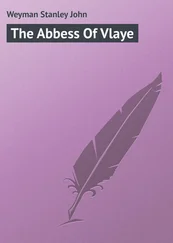Stanley Weyman - The Red Cockade
Здесь есть возможность читать онлайн «Stanley Weyman - The Red Cockade» — ознакомительный отрывок электронной книги совершенно бесплатно, а после прочтения отрывка купить полную версию. В некоторых случаях можно слушать аудио, скачать через торрент в формате fb2 и присутствует краткое содержание. Жанр: foreign_prose, на английском языке. Описание произведения, (предисловие) а так же отзывы посетителей доступны на портале библиотеки ЛибКат.
- Название:The Red Cockade
- Автор:
- Жанр:
- Год:неизвестен
- ISBN:нет данных
- Рейтинг книги:4 / 5. Голосов: 1
-
Избранное:Добавить в избранное
- Отзывы:
-
Ваша оценка:
- 80
- 1
- 2
- 3
- 4
- 5
The Red Cockade: краткое содержание, описание и аннотация
Предлагаем к чтению аннотацию, описание, краткое содержание или предисловие (зависит от того, что написал сам автор книги «The Red Cockade»). Если вы не нашли необходимую информацию о книге — напишите в комментариях, мы постараемся отыскать её.
The Red Cockade — читать онлайн ознакомительный отрывок
Ниже представлен текст книги, разбитый по страницам. Система сохранения места последней прочитанной страницы, позволяет с удобством читать онлайн бесплатно книгу «The Red Cockade», без необходимости каждый раз заново искать на чём Вы остановились. Поставьте закладку, и сможете в любой момент перейти на страницу, на которой закончили чтение.
Интервал:
Закладка:
How long I should have endured this penance-these veiled insults and the courtesy that stung deeper-before I plucked up spirit to withdraw, I cannot say. It was an interposition from without that broke the spell. An usher came to me with a note. I opened it with clumsy fingers under a fire of hostile eyes, and found that it was from Louis.
"If you have a spark of honour" – it ran-"you will meet me, without a moment's delay, in the garden at the back of the Chapter House. Do so, and you may still call yourself a gentleman. Refuse, or delay even for ten minutes, and I will publish your shame from one end of Quercy to the other. He cannot call himself Adrien du Pont de Saux, who puts up with a blow!"
I read it twice while the usher waited. The words had a cruel, heartless ring in them; the taunting challenge was brutal in its directness. Yet my heart grew soft as I read, and I had much ado to keep the tears from my eyes-under all those eyes. For Louis did not deceive me this time. This note, so unlike him, this desperate attempt to draw me out, and save me from opponents more ruthless, were too transparent to delude me; and, in a moment, the icy bands which had been growing over me melted. I still sat alone; but I was not quite deserted. I could hold up my head again, for I had a friend. I remembered that, after all, through all, I was Adrien du Pont de Saux, guiltless of aught worse than holding in Quercy opinions which the Lameths and Mirabeaus, the Liancourts and Rochefoucaulds held in their provinces; guiltless, I told myself, of aught besides standing for right and justice.
But the usher waited. I took from the desk before me a scrap of paper, and wrote my answer. "Adrien does not fight with Louis because St. Alais struck Saux."
I wrapped it up and gave it to the usher; then I sat back a different man, able to meet all eyes, with a heart armed against all misfortunes. Friendship, generosity, love, still existed, though the gentry of Quercy, the Gontauts, and Marignacs, sat aloof. Life would still hold sweets, though the grass should grow in the walnut avenue, and my shield should never quarter the arms of St. Alais.
So I took courage, stood up, and moved to go out. But the moment I did so, a dozen Members sprang to their feet also; and, as I walked down one gangway towards the door, they crowded down another parallel with it; offensively, openly, with the evident intention of intercepting me before I could escape. The commotion was so great that the President paused in his reading to watch the result; while the mass of Members who kept their places, rose that they might have a better view. I saw that I was to be publicly insulted, and a fierce joy took the place of every other feeling. If I went slowly, it was not through fear; the pent-up passions of the last hour inspired me, and I would not have hastened the climax for the world. I reached the foot of the gangway, in another moment we must have come into collision, when an abrupt explosion of voices, a great roar in the street, that penetrated through the closed windows, brought us to a halt. We paused, listening and glaring, while the few who had not stood up before, rose hurriedly, and the President, startled and suspicious, asked what it was.
For answer the sound rose again-dull, prolonged, shaking the windows; a hoarse shout of triumph. It fell-not ceasing, but passing away into the distance-and then once more it swelled up. It was unlike any shout I had ever heard.
Little by little articulate words grew out of it, or succeeded it; until the air shook with the measured rhythm of one stern sentence. " A bas la Bastille! A bas la Bastille! "
We were to hear many such cries in the time to come, and grow accustomed to such alarms; to the hungry roar in the street, and the loud knocking at the door that spelled fate. But they were a new thing then, and the Assembly, as much outraged as alarmed by this second trespass on its dignity, could only look at its President, and mutter wrathful threats against the canaille . The canaille that had crouched for a century seemed in some unaccountable way to be changing its posture!
One man cried out one thing, and one another; that the streets should be cleared, the regiment sent for, or complaint made to the Intendant. They were still speaking when the door opened and a Member came in. It was Louis de St. Alais, and his face was aglow with excitement. Commonly the most modest and quiet of men, he stood forward now, and raised his hand imperatively for silence.
"Gentlemen," he said, in a loud, ringing voice, "there is strange news! A courier with letters for my brother, M. de St. Alais, has spoken in the street. He brings strange tidings."
"What?" two or three cried.
"The Bastille has fallen!"
No one understood-how should they? – but all were silent. Then, "What do you mean, M. St. Alais?" the President asked, in bewilderment; and he raised his hand that the silence might be preserved. "The Bastille has fallen? How? What is it?"
"It was captured on Tuesday by the mob of Paris," Louis answered distinctly, his eyes bright, "and M. de Launay, the Governor, murdered in cold blood."
"The Bastille captured? By the mob?" the President exclaimed incredulously. "It is impossible, Monsieur. You must have misunderstood."
Louis shook his head. "It is true, I fear," he said.
"And M. de Launay?"
"That too, I fear, M. le President."
Then, indeed, men looked at one another; startled, pale-faced, asking each mute questions of his fellows; while in the street outside the hum of disorder and rejoicing grew moment by moment more steady and continuous. Men looked at each other alarmed, and could not believe. The Bastille which had stood so many centuries, captured? The Governor killed? Impossible, they muttered, impossible. For what, in that case, was the King doing? What the army? What the Governor of Paris?
Old M. de Gontaut put the thought into words. "But the King?" he said, as soon as he could get a hearing. "Doubtless his Majesty has already punished the wretches?"
The answer came from an unexpected quarter, in words as little expected. M. de St. Alais, to whom Louis had handed a letter, rose from his seat with an open paper in his hand. Doubtless, if he had taken time to consider, he would have seen the imprudence of making public all he knew; but the surprise and mortification of the news he had received-news that gave the lie to his confident assurances, news that made the most certain doubt the ground on which they stood, swept away his discretion. He spoke.
"I do not know what the King was doing," he said, in mocking accents, "at Versailles; but I can tell you how the army was employed in Paris. The Garde Française were foremost in the attack. Besenval, with such troops as have not deserted, has withdrawn. The city is in the hands of the mob. They have shot Flesselles, the Provost, and elected Bailly, Mayor. They have raised a Militia and armed it. They have appointed Lafayette, General. They have adopted a badge. They have-"
"But, mon Dieu! " the President cried aghast. "This is a revolt!"
"Precisely, Monsieur," St. Alais answered.
"And what does the King?"
"He is so good-that he has done nothing," was the bitter answer.
"And the States General? – the National Assembly at Versailles?"
"Oh, they? They too have done nothing."
"It is Paris, then?" the President said.
"Yes, Monsieur, it is Paris," the Marquis answered. "But Paris?" the President exclaimed helplessly. "Paris has been quiet so many years."
To this, however, the thought in every one's mind, there seemed to be no answer. St. Alais sat down again, and, for a moment, the Assembly remained stunned by astonishment, prostrate under these new, these marvellous facts. No better comment on the discussions in which it had been engaged a few minutes before could have been found. Its Members had been dreaming of their rights, their privileges, their exemptions; they awoke to find Paris in flames, the army in revolt, order and law in the utmost peril.
Читать дальшеИнтервал:
Закладка:
Похожие книги на «The Red Cockade»
Представляем Вашему вниманию похожие книги на «The Red Cockade» списком для выбора. Мы отобрали схожую по названию и смыслу литературу в надежде предоставить читателям больше вариантов отыскать новые, интересные, ещё непрочитанные произведения.
Обсуждение, отзывы о книге «The Red Cockade» и просто собственные мнения читателей. Оставьте ваши комментарии, напишите, что Вы думаете о произведении, его смысле или главных героях. Укажите что конкретно понравилось, а что нет, и почему Вы так считаете.












